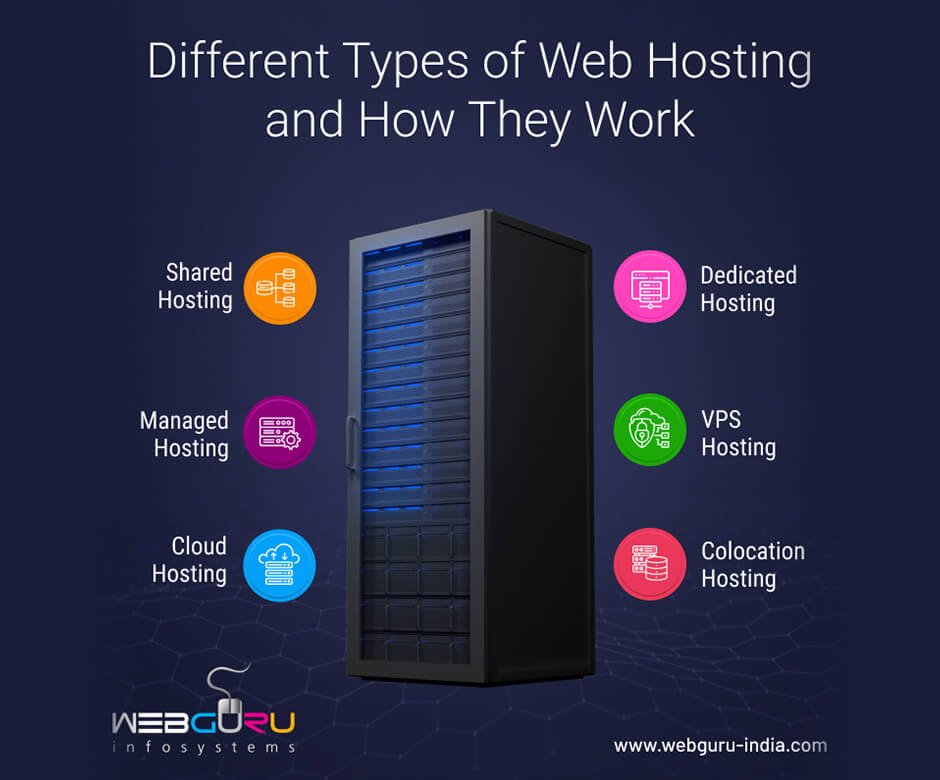Home Blog Website Development Different Types of Web Hosting and How They Work
Different Types of Web Hosting and How They Work
- 08 Oct / 2022
- 1,627 views
- 5 Min Read

Every website on the internet lives on a server somewhere. These servers are computers that use their processing power to keep the website afloat, receive user queries, and send out results. They are configured to display a website’s content and handle all the traffic that the site receives. It is imperative that you choose good web hosting, as it is one of the primary factors that affect your site’s performance. Choosing the right hosting plan for your website depends on the 3 things – your technology requirements, expected traffic, and budget.
Different Types of Web Hosting
There are several kinds of hosting services to choose from, each catering to a different kind of industry. With an understanding of these types, you will be able to identify exactly what your website requires.
1. Shared Hosting
If you’ve just started out with a website, have relatively low traffic, and are looking for a cost-effective hosting option, this is the choice for you. Your website gets stored on the same server as several other sites. All the domains involved have access to the same resources such as computing power, processing speeds, RAM, and so on. Having shared resources also keeps the hosting costs significantly low, which makes them a great option for website owners that have just started.
While simple and inexpensive, shared hosting also brings with it some issues. SInce you’re going to share a server with limited resources with several other domains, a surge in usage can affect not just your site’s user experience, but others as well. This is why it is only well suited for sites that don’t receive a huge amount of traffic.
2. Dedicated Hosting
If you’re the owner of a large website and want to be in full control, this is the option to go for. Dedicated hosting means you have a server exclusively for yourself, with your website being the only domain stored in it. You have complete root and admin access to the server, which means you can scale it as you see fit, and control everything from the operating system to the security solutions you wish to have.
This is one of the more expensive options when it comes to hosting, and typically meant for big, established brands that expect enormous traffic to their website. In such cases, it is always an advantage to have full control over the servers. However, installing and managing such high traffic servers also requires significant technical expertise.
3. VPS Hosting
If you have outgrown the limits of your shared hosting plan, but don’t want to shift to an expensive dedicated plan just yet, then this is the option for you. A Virtual Private Server (VPS) is a solid middle ground, which gives you much more control than a shared server would. It is still a shared physical server, but each domain is hosted within its own private space. VPS hosting is not able to handle very high traffic the way a dedicated server can, so usage spikes on your site or other sites on the server can still affect performance across the board. However, you get much more storage space and customization options. It’s a good choice for advanced users who want the benefits of dedicated hosting, but don’t have the technical expertise or resources to manage one.
4. Cloud Hosting
This is currently the most popular kind of hosting within the tech industry – “cloud” has pretty much become a buzzword nowadays. If you’re the owner of a rapidly growing website and need extremely scalable resources, cloud hosting is the way to go. Cloud hosting falls under Infrastructure-as-a-Service (IaaS), provided to website owners as a utility. AWS is one of the leading names in cloud hosting services.
It involves several computers that run your applications together using a combined processing power. This means you can scale up and down your resources as and when you need them, and pay for exactly what you require. It is a flexible solution, and since it runs across multiple servers you experience very little downtime if one of them faces some malfunction. This is very important in keeping a standard user experience even if such an issue occurs.
You may also like to read: Which is better for you – Shared Hosting or Cloud Hosting?
5. Managed Hosting
This constitutes the large majority of hosting packages you are likely to come across. If you’re looking for a hosting provider that will take care of all of your technical aspects while you get whatever package you choose, then this is your best option. Technical services like setting up, configuring, and managing the software and hardware, replacements, patches & updates, technical support, and monitoring are all looked after by your hosting providers. They look after the daily management of your resources and operating systems, all within the plan you choose for your site.
6. Colocation Hosting
This is a significantly expensive option, but it gives you maximum control of the hardware and software resources you’ll have at your disposal. Colocation centers are essentially data centers where you can store your equipment. They will provide you storage, bandwidth, an IP address, and even cooling and other kinds of equipment that your server will require. The amount of space you choose to rent will determine your costs.
A normal office server will not be able to provide you with the same kind of bandwidth that colocation can provide you. However, you’re expected to take care of all of your devices yourself, including the hardware, software, services, as well the maintenance, upgrades, and so on. This requires extensive technical expertise, and can also rack up expenses.
Conclusion
While there are many options to choose from, it all comes down to your exact requirements, and your ability to spend. All the plans come at their own cost, and you need a plan that fits both your needs as well as your budget. Each of the plans mentioned here have been created to cater to the specifications of different kinds of businesses. Ask your chosen web developers to guide you to an appropriate hosting. Once you figure out what kind of website you want, what kind of traffic you expect, and what kind of resources you will need, choosing a hosting solution can become an easy task.
6 comments
Leave a Reply

-
1000+
Happy
Clients -
25+
Countries
Served -
19+
Years of
Trust









Very important and useful information.
Web hosting seemed to me like the stuff for geeks. However, the blog has made it simpler to understand and help businesses choose one based on one’s requirements.
We thank you for appreciating the content of our blog on web hosting.
When choosing web hosting, we must keep a few factors in mind like reliability, scalability, flexibility, security, data backup, etc. This blog gives a proper idea regarding these aspects of web hosting.
Web hosting is an important part of the overall process of developing and deploying a website. The blog nicely explained different types of web hosting and their functionalities.
The blog helped me understand how hosting works, its requirement, and how to get it done.